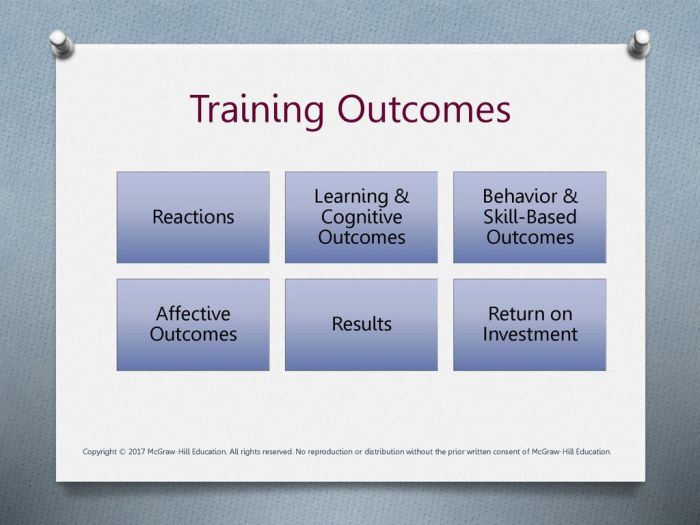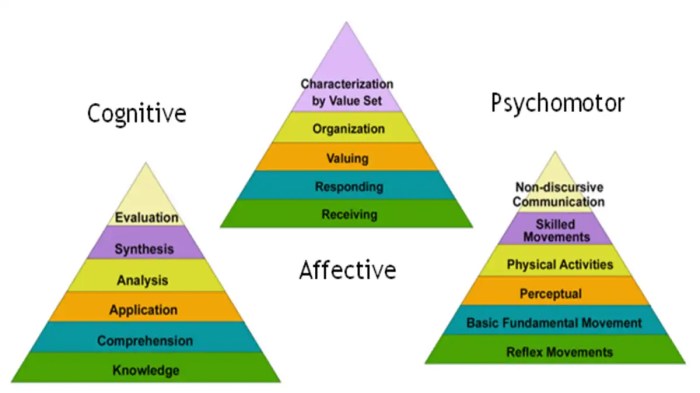Cognitive skill-based affective results and return on investment are all – Cognitive skill-based affective results and return on investment (ROI) are inextricably linked, forming the cornerstone of educational and organizational effectiveness. This article delves into the intricate relationship between these concepts, exploring their measurement, enhancement, and the tangible benefits they yield.
Cognitive skill-based affective results encompass the emotional, motivational, and attitudinal outcomes resulting from cognitive skill development. These results are crucial in various domains, including education, workplace performance, and personal well-being.
1. Cognitive Skill-Based Affective Results

Cognitive skill-based affective results refer to the emotional and motivational outcomes that stem from the acquisition and application of cognitive skills. These results encompass a wide range of affective dimensions, including attitudes, values, beliefs, interests, and self-efficacy.
Examples of cognitive skill-based affective results include:
- Increased motivation to learn
- Improved self-esteem and confidence
- Enhanced problem-solving abilities
- Greater empathy and compassion
- Increased resilience and adaptability
Cognitive skill-based affective results are of paramount importance in various domains, including:
- Education: Fostering positive attitudes towards learning, improving motivation, and enhancing academic achievement.
- Workplace: Enhancing job satisfaction, increasing productivity, and promoting teamwork and collaboration.
- Personal development: Promoting self-awareness, building resilience, and fostering healthy relationships.
li>Social well-being: Cultivating empathy, tolerance, and civic engagement.
2. Measurement and Assessment of Cognitive Skill-Based Affective Results
Measuring and assessing cognitive skill-based affective results is crucial for evaluating their impact and effectiveness. Various methods can be employed, including:
- Self-report questionnaires
- Interviews and focus groups
- Observation and behavior analysis
- Physiological measures (e.g., heart rate, skin conductance)
- Performance-based assessments
Challenges associated with measuring and assessing cognitive skill-based affective results include:
- Subjectivity and self-reporting bias
- Contextual influences and confounding variables
- Longitudinal and multi-dimensional nature of affective results
Best practices for measuring and assessing cognitive skill-based affective results include:
- Using multiple methods to triangulate data
- Employing valid and reliable instruments
- Considering contextual factors and controlling for confounding variables
- Establishing clear baselines and monitoring changes over time
- Involving stakeholders in the assessment process
3. Enhancing Cognitive Skill-Based Affective Results: Cognitive Skill-based Affective Results And Return On Investment Are All

Strategies for enhancing cognitive skill-based affective results include:
- Providing explicit instruction and feedback on cognitive skills
- Creating opportunities for practice and application of cognitive skills
- Fostering a positive and supportive learning environment
- Using technology to enhance cognitive skill development
- Incorporating affective elements into cognitive skill training programs
Evidence-based interventions that have been shown to enhance cognitive skill-based affective results include:
- Metacognitive training
- Self-regulation strategies
- Mindfulness and attention training
- Social and emotional learning programs
Technology can play a significant role in enhancing cognitive skill-based affective results by:
- Providing personalized learning experiences
- Enabling collaborative learning and peer support
- Offering real-time feedback and data visualization
- Gamifying learning experiences and making them more engaging
4. Return on Investment of Cognitive Skill-Based Affective Results

Calculating the return on investment (ROI) of cognitive skill-based affective results involves quantifying the benefits and costs associated with implementing interventions that enhance these results.
Benefits of cognitive skill-based affective results include:
- Improved academic achievement
- Increased job satisfaction and productivity
- Reduced turnover and absenteeism
- Enhanced civic engagement and social well-being
Costs of implementing interventions that enhance cognitive skill-based affective results include:
- Program development and implementation costs
- Staff training and development costs
- Technology and resource costs
Case studies that demonstrate the ROI of cognitive skill-based affective results include:
- A study by the RAND Corporation found that a social and emotional learning program implemented in Chicago public schools resulted in a 15% increase in high school graduation rates.
- A study by the University of Pennsylvania found that a mindfulness training program for employees in the financial industry led to a 20% increase in productivity.
Factors that influence the ROI of cognitive skill-based affective results include:
- The quality of the intervention
- The fidelity of implementation
- The target population
- The organizational context
Popular Questions
What are cognitive skill-based affective results?
Cognitive skill-based affective results are the emotional, motivational, and attitudinal outcomes that arise from cognitive skill development.
How are cognitive skill-based affective results measured?
Various methods exist to measure cognitive skill-based affective results, including surveys, self-report questionnaires, and behavioral observations.
What are the benefits of enhancing cognitive skill-based affective results?
Enhancing cognitive skill-based affective results can lead to improved motivation, engagement, creativity, and overall well-being.
How can technology be used to enhance cognitive skill-based affective results?
Technology can be leveraged to provide personalized learning experiences, track progress, and provide feedback, all of which can contribute to enhancing cognitive skill-based affective results.
